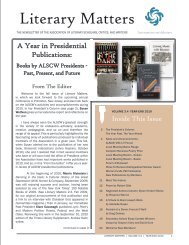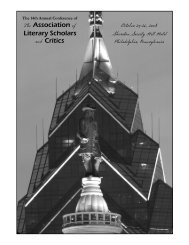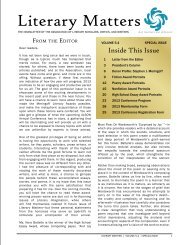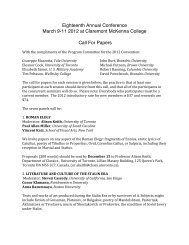Literary Matters 5.3 - Association of Literary Scholars, Critics, and ...
Literary Matters 5.3 - Association of Literary Scholars, Critics, and ...
Literary Matters 5.3 - Association of Literary Scholars, Critics, and ...
You also want an ePaper? Increase the reach of your titles
YUMPU automatically turns print PDFs into web optimized ePapers that Google loves.
I want to address a question that confrontsanyone who plans to stage Othello, but onethat critics tend to ignore: Where does Othelloget the weapon with which he kills himself?And I will suggest that the answer may well liein what critics have by no means ignored—hislast speech.Now although the critics seem disinterestedabout what weaponry Othello mayhave on his person as he is being ledaway, Shakespeare certainly does not, foron two prior occasions in the scene,he calls special attention to Othello’sweaponless state:first, when Montanodisarmshimafter hisattack onIago (“Iam notvaliantneither /But everypuny whipstergets my sword”[5.2.252–53] 1 );<strong>and</strong> again after he has re-armed himselfwith a sword secreted in the room <strong>and</strong> haswounded Iago with it (“Wrench his sword fromhim,” Lodovico comm<strong>and</strong>s [5.2.296]).Othello’s Lastm<strong>and</strong> is taken <strong>of</strong>f, / And Cassio rules in Cyprus”(5.2.339–41). But he will shortly discoverthat it is one thing to take <strong>of</strong>f Othello’scomm<strong>and</strong> <strong>and</strong> quite another to remove hispower, for when he tells him he “shall closeprisoner rest” (5.2.344) <strong>and</strong> gives the order,“Come, bring [him] away" (5.2.46), 2 Othellostops the general exodus by employing,for one last time, the “Othello magic,” thespell his spoken words evoke: “S<strong>of</strong>t you; aword or two before you go” (5.2.347). Thenin the eighteen lines that follow, hecharms his listeners with his words, ashe has done before when quellingthe incipient brawlthat Iago was stirringup amongBrabantio’sfollowerswith thesingle linethat manifeststhepower <strong>of</strong>his presence:“Keep up your brightswords, for the dewwill rust them” (1.2.60), <strong>and</strong> again in the“round unvarnish’d tale” that enchants hislisteners in the Duke’s council as it had enchantedDesdemona earlier (1.3.130–72).Speech: The Why <strong>of</strong> Itby John FreundThen, after a brief interlude, Lodovico turnsto Othello: “You must forsake this room<strong>and</strong> go with us. / Your power <strong>and</strong> your com-This article, with several additions <strong>and</strong> some minor alterations, is arevision <strong>of</strong> a paper delivered by the author in 2008 at the PennsylvaniaCollege English <strong>Association</strong> Conference in State College, PA.It never appeared in print, <strong>and</strong> was itself a considerable expansion<strong>of</strong> the section on Othello, “The Turk Within,” in Freund’s BrokenSymmetries: A Study <strong>of</strong> Agency in Shakespeare's Plays (New York:Peter Lang, 1991), 144–48. That treatment—as is the present one—was partially indebted to the late Pr<strong>of</strong>essor Edward Callan, a formercolleague from Western Michigan University. In the early 60s, headvanced the theory in a never-published paper that Othello’s lastspeech was—contrary to the opinions <strong>of</strong> Eliot <strong>and</strong> Leavis—for thepurpose <strong>of</strong> freeing himself from the grip <strong>of</strong> his guards, one arm at atime, as suggested by the text <strong>of</strong> the speech itself.1 This <strong>and</strong> all subsequent quotations from Othello are taken fromDavid Bevington ed., The Complete Works <strong>of</strong> Shakespeare, 3rded., (Glenview, IL: Scott, Foresman, <strong>and</strong> Company, 1980) unlessotherwise noted.Now, at the present juncture, his calm cadencesweave their spell once more beforethey culminate in the “bloody period” in whichtale <strong>and</strong> teller merge in a sudden crescendo<strong>of</strong> violence: “I took by the throat the circumciseddog, / And smote him, thus (stabs himself)”(5.2.364–65). Moments later, Cassioremarks, “This did I fear, but thought he hadno weapon” (5.2.369).Didn’t we all?2 This is the reading given by the First Quarto, one that has beenadopted by at least one modern edition—Hardin Craig <strong>and</strong> DavidBevington, eds., The Complete Works <strong>of</strong> Shakespeare, rev. ed.,(Glenview, IL: Scott, Foresman, <strong>and</strong> Company, 1973), 978—whichmakes explicit that it is Othello who is being compelled to leave.20 LITERARY MATTERS | VOLUME <strong>5.3</strong> | FaLL/WINTER 2012







